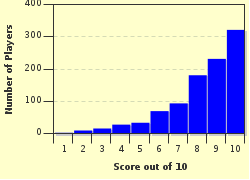Quiz Answer Key and Fun Facts
1. In the sixteenth and seventeenth centuries, there was a stable owner in England who would rent you any horse you wanted, so long as it was the horse in the stall next to the stable door. What do we call this kind of option?
2. This rhetorical device is named for the town that the 14th-century friar William lived in, and it states, basically, that the simplest explanation is usually the correct one. What do we call this principle?
3. Referring to an Austrian scientist and his gedankenexperiment, which is the feline that might be alive or might be dead--or might be both?
4. Referencing one of Jesus' disciples, what is the idiom that you might use to describe someone who demands proof before he commits to something?
5. Someone who looks intimidating but is really a big softie might be referred to as this, named for an American president. What's the term?
6. What idiom, referring to a courtier in the court of Dionysius II of Syracuse, might you use to imply a doom that's barely contained and could hit at any time?
7. In 1928, Peter Markus invented and patented an inflatable life preserver. During World War II, some bright soldier noted that its...pneumatic...shape resembled a celebrity. What did the US soldiers and British Air Force servicemen call this device?
8. What is the term that waiters and waitresses use in hash house slang to indicate that a customer wants a glass of water?
9. In Italy they called it "the French disease", in France "the Italian disease". Russians called it "the Polish disease", Turks "the Christian disease" and the Dutch "the Spanish disease". What is the real name for this disease that's attracted so many national names?
10. Finally, in the Superman comic books, television show, radio series, and movies, "Daily Planet" editor Perry White is wont to use an exclamation that references a historical figure. What's the expression?
Source: Author
john_sunseri
This quiz was reviewed by FunTrivia editor
CellarDoor before going online.
Any errors found in FunTrivia content are routinely corrected through our feedback system.


